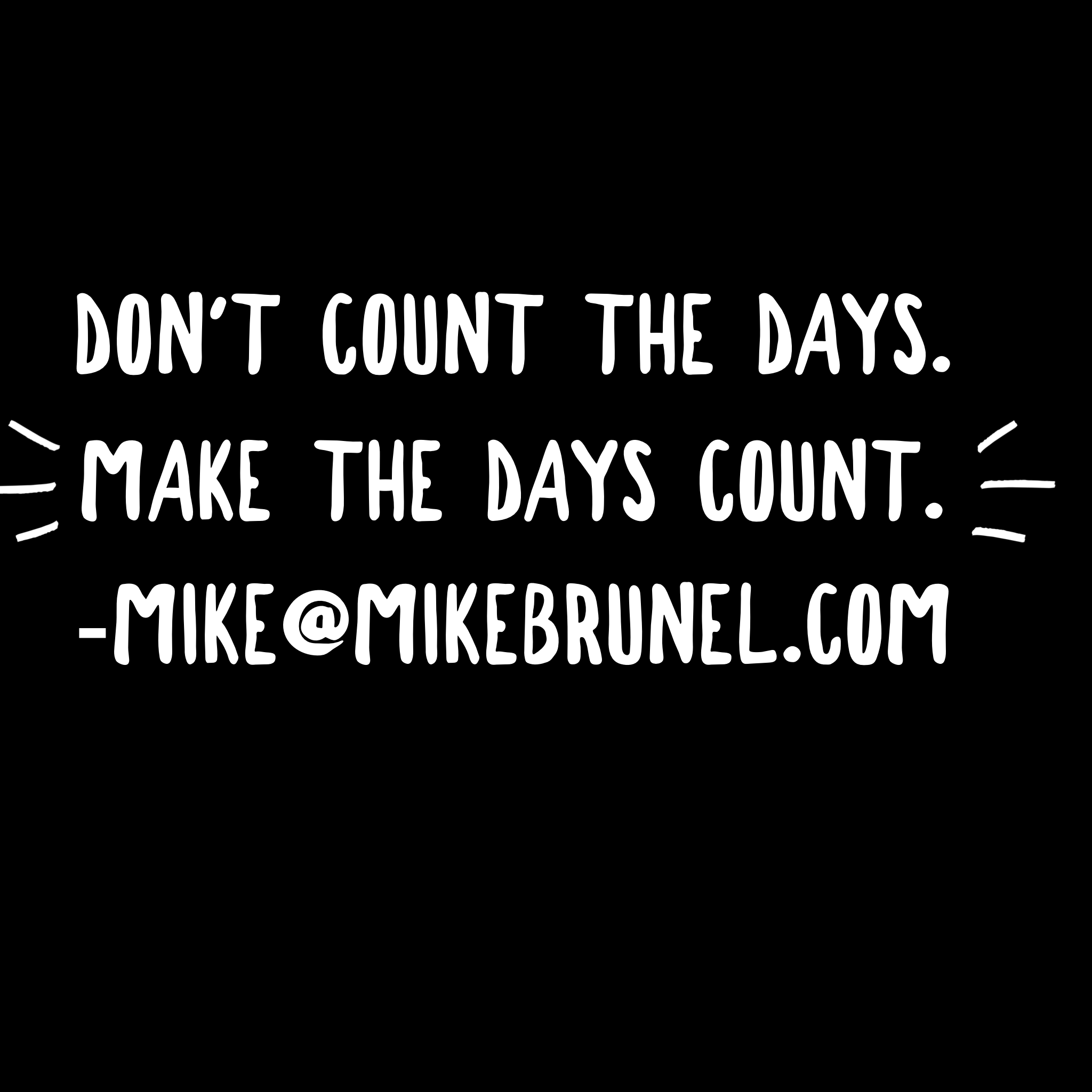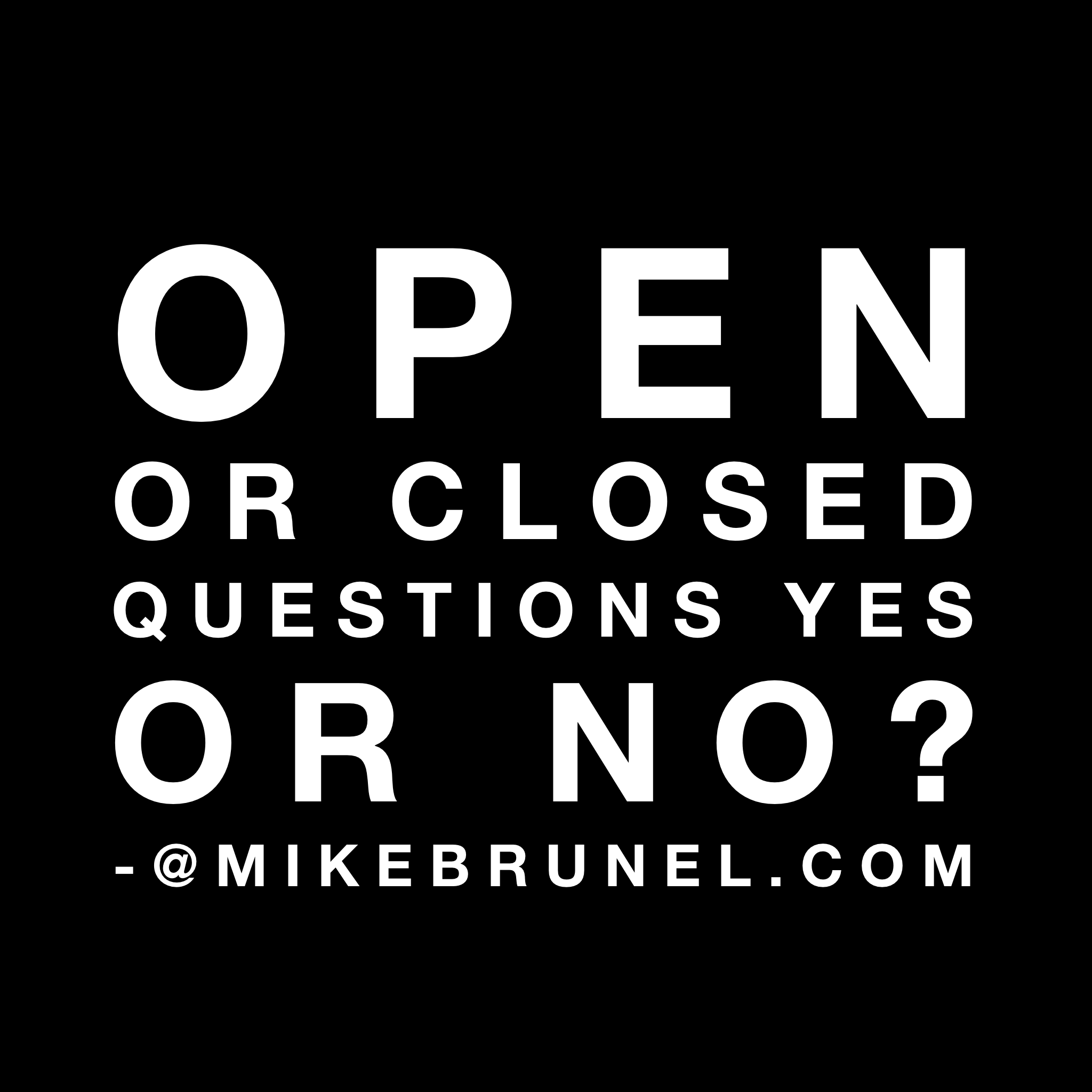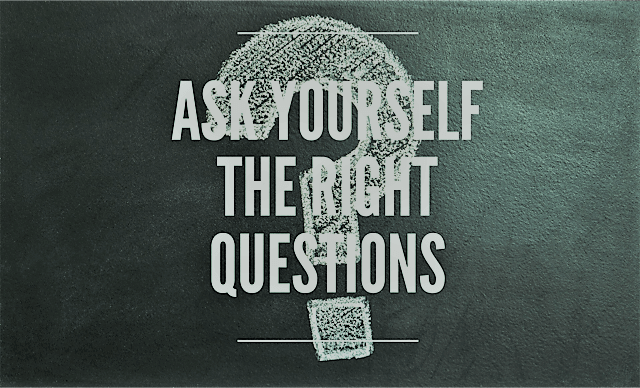by Mike Brunel | Apr 6, 2018 | Sales
Have you heard about Speed Selling?
Speed Selling is a great way to launch a company and I have participated in it several times.
Over the years it has become a lot more sophisticated. My old company, NRS Media, has fine-tuned it to pretty much launch a brand new media company into profit from day one. More on that idea later.
Speed Selling
My first experience with Speed Selling was at a part-time radio station in a small town of 15,000 people. As FM radio developed in my country many potential operators were given temporary licenses to run 90-day radio stations, usually in tourist towns.
The potential bidder who was proposing a full-time license used this temporary 90-day station concept to build creditability and see if a format they used would be accepted by the community. If they did, they were granted a full-time FM license.
How Speed Selling worked
Each salesperson was given a certain “show to sell”. For example the “Top Ten at Ten”, the “American Top 40 with Rick Dees”, sponsorships and any generic type music programme that could be sold off for 90 days.
The trick was there was no price on the programme, just a guideline. The sales rep could not go below the number but could go above, the highest price got the sale, and the sales manager was the final judge.
The competition was run over an hour for each show. Each rep had to go out and cold call, sell the product; get the client to sign an agreement with the time and the price they were prepared to pay.
You then came back to the station to see how you got on.
It was great; speed was the key, because if the price was acceptable to the sales manager, then you got the next one, and off you went with a 15-minute bonus.
The other guys had to sit around for 15 minutes before they could go out and sell the next programme.
It proved very successful and loads of fun. Why don’t you try this idea with your team? Not too hard to do, add in some incentives, a few prizes and you will be amazed how much fun it is.
Other tools to Speed Sell.
One to Many.
This idea built my previous company NRS Media from zero sales to $350 million annually.
It was a seminar based model where business owners were invited to a hotel to hear the latest trends and ideas on advertising. Usually in groups of 15-20 advertisers. At the end of the presentation, every attendee was offered an advertising package- usually a 12-month investment.
On average we could generate $600-$1 million in sales using this model. That was over a week!
I have since sold that company, but still today this type of speed selling works. It’s moved on a little, but can be adapted to any company if you have a product launch that requires speed.
Taking action and speed in selling is very important. Often the one ingredient missing is training, you can’t ignore it.
I wrote all the sales and marketing manuals at NRS Media and perfected the execution, but without our famous Bootcamps, our people would never have had the success they achieved.
I take my hat off to the team that drove those in our business. Training is the one neglected tool that gets you the most sales.
Many companies ignore it because it takes time, but as the saying goes “we could not afford not to do it”
There are a few more speed selling idea, love to share.
As always.
Find a way to sell more of your stuff….
Mike

Mike Brunel started mikebrunel.com after being a successful entrepreneur and founder of NRS Media. He co-founded NRS Media in Wellington, New Zealand, expanded it into a global powerhouse in media sales and training, and was eventually responsible for opening offices in London, Atlanta, Toronto, Sydney, Capetown, and Bogota. His products and services are now sold in 23 countries and in 11 languages generating $350 million annually in sales for his clients. Mike sold the company in 2015 and now spends his time following his passions which include rugby, travel. His promise: “I can find thousands of dollars in your business within minutes – GUARANTEED” TRY ME
by Mike Brunel | Mar 20, 2018 | Leadership, Sales, Strategy
Decide your Personal Operating Procedures
In my last post, I talked about the story of Contiki, this excellent travel company born out an idea of John Anderson that provided 18-35-year-olds an avenue to see the world in the company of people their same age.
In his book “Only Two Seats Left” (link) www.onlytwoseatsleft.com John Anderson the founder lists 25 personal and business messages. These are sprinkled through the book.
I have picked out two in this post and a couple in my next post to illustrate the need for something to think about this coming year.
- Do not research an idea to death – often go with your gut feel.
This is one of the common mistakes many startups and people new to business make, they analyse until they are paralysed.
The truth is that they are paralysed with fear, and are afraid to “just do it” as Nike would say.
If there are ideas out there that you have wanted to try then make a promise that you will try.
- Specialise & be the best in the market.
You can’t be all things to everyone. Salespeople in this new economy have to find a new way of doing business you now need a good story; you need a reason to be in your market, with your opposition, that sets you apart from that opposition.
The reality is the economy is getting cleaned out- it was badly needed, and its happening, the worst employees, the worst salespeople and the worst managers are moving on.
Salespeople have to be problems solvers for their client, not their company they represent.
Our clients know and hear a sales pitch, they defend, use tactics to say no.
What they want are ideas, ways to solve their problems, just like John, who had an idea.
Have fun selling your stuff.
Mike
PS Looking for ideas to help your sales improve, contact me for a FREE 45-minute sales session.
 Mike Brunel started mikebrunel.com after being a successful entrepreneur and founder of NRS Media. He co-founded NRS Media in Wellington, New Zealand, expanded it into a global powerhouse in media sales and training, and was eventually responsible for opening offices in London, Atlanta, Toronto, Sydney, Capetown, and Bogota. His products and services are now sold in 23 countries and in 11 languages generating $350 million annually in sales for his clients. Mike sold the company in 2015 and now spends his time following his passions which include rugby, travel. His promise: “I can find thousands of dollars in your business within minutes – GUARANTEED” TRY ME
Mike Brunel started mikebrunel.com after being a successful entrepreneur and founder of NRS Media. He co-founded NRS Media in Wellington, New Zealand, expanded it into a global powerhouse in media sales and training, and was eventually responsible for opening offices in London, Atlanta, Toronto, Sydney, Capetown, and Bogota. His products and services are now sold in 23 countries and in 11 languages generating $350 million annually in sales for his clients. Mike sold the company in 2015 and now spends his time following his passions which include rugby, travel. His promise: “I can find thousands of dollars in your business within minutes – GUARANTEED” TRY ME
by Mike Brunel | Feb 21, 2018 | Sales
Well managed well throughout incentive programs play an important part in achieving and exceeding sales targets. If you incentives are structured properly they can result in a high level of motivation.
Here are a few basic principles I recommend to my clients.
- Avoid incentives where individual salespeople are competing directly with each other to win a single prize. This often causes animosity. It is much better to ensure that every person has a chance to achieve an incentive by reaching a certain level of sales.
2. Incentives should be introduced with some pizzazz and excitement to help generate an air of urgency. Incentives are designed to get salespeople excited and motivated so the way they are presented needs to reflect this.
3. Incentives should not be long-term – usually a month and, under certain circumstances, incentives could be offered for one week only. Don’t’ make the mistake of running incentive programmes more than three months.
The fact is It is hard to sustain interest in incentive programs if they are run the over too long a period of time. Salespeople tend to focus on incentives only when they are close to achieving them. A year-long incentive, for example, will only really generate real interest among salespeople about three months from the end of the year (by which time it’s too late to impact on the result) – for the rest of the year, the incentive seems too far away.
Have a great week selling your stuff.
Mike
PS.Have you tried out my 7-day challenge yet?
 Mike Brunel started mikebrunel.com after being a successful entrepreneur and founder of NRS Media. He co-founded NRS Media in Wellington, New Zealand, expanded it into a global powerhouse in media sales and training, and was eventually responsible for opening offices in London, Atlanta, Toronto, Sydney, Capetown, and Bogota. His products and services are now sold in 23 countries and in 11 languages generating $350 million annually in sales for his clients. Mike sold the company in 2015 and now spends his time following his passions which include rugby, travel. His promise: “I can find thousands of dollars in your business within minutes – GUARANTEED” TRY ME OUT!
Mike Brunel started mikebrunel.com after being a successful entrepreneur and founder of NRS Media. He co-founded NRS Media in Wellington, New Zealand, expanded it into a global powerhouse in media sales and training, and was eventually responsible for opening offices in London, Atlanta, Toronto, Sydney, Capetown, and Bogota. His products and services are now sold in 23 countries and in 11 languages generating $350 million annually in sales for his clients. Mike sold the company in 2015 and now spends his time following his passions which include rugby, travel. His promise: “I can find thousands of dollars in your business within minutes – GUARANTEED” TRY ME OUT!
I
by Mike Brunel | Jan 17, 2018 | Sales
 One Hour a day to Accomplish Your Goals.
One Hour a day to Accomplish Your Goals.
In our first article on goals for 2018, I talked about overcoming the obstacles that prevent you from accomplishing those goals.
In this article, I am going to talk abo, t spending time each day to help you stay on track and chunk down the activity you devote to achieving your goals.
Do you know that every day you can create an hour to help fulfill your goals and keep you on track?
The answer is “start” each day a little earlier than your fellow workers.
And plan tomorrow today…
One of my early mentors and previous partners at NRS Media, Brian Duffy, taught me this valuable tip.
Plan Tomorrow Today – I first met Brian when he was a consultant to one of the first media companies I worked for.
He would always sit me down on his visits and ask me this simple question:
“Have you set goals for what you are going to achieve tomorrow? More importantly, have you looked at what you have achieved today and congratulated yourself?”
This piece of advice has stayed with me to this day. Most days I plan what I am going to do the next day using this simple method.
At the end of each day, I review what I have achieved for the day, taking about 30 seconds to mentally pat myself on the back.
Even if I only managed to get a couple of tasks done, this simple exercise gives you a sense of achievement. If you don’t do this, you honestly feel as if you have achieved nothing.
Acknowledge your achievements no matter how small they may seem. Every day is a path to appreciation of self.
I then look at what I have not been able to achieve due to timing and other factors and place them on my plan for the following day. No judgments.
I then look at all the meetings and appointments and place them on my plan for the following day as well.
Finally, I take about 10 minutes to study what my priorities are for the month, quarter and year. I select 3-4 goals I want to achieve as soon as I return to my office that is in alignment with these goals.
It works for me; it just might be the tonic for you.
Have fun selling your stuff in 2018.
Mike

Mike Brunel started mikebrunel.com after being a successful entrepreneur and founder of NRS Media. He co-founded NRS Media in Wellington, New Zealand, expanded it into a global powerhouse in media sales and training, and was eventually responsible for opening offices in London, Atlanta, Toronto, Sydney, Capetown, and Bogota. His products and services are now sold in 23 countries and in 11 languages generating $350 million annually in sales for his clients. Mike sold the company in 2015 and now spends his time following his passions which include rugby, travel. His promise: “I can find thousands of dollars in your business within minutes – GUARANTEED” TRY ME OUT!
by Mike Brunel | Nov 21, 2017 | Sales
 How do you train your salespeople to have fun selling?
How do you train your salespeople to have fun selling?
People can learn to ask open-ended questions. There’s a great exercise I do with salespeople, called “What’s in my pocket?” It was taught to me by one of my best staff members—and best friends—at NRS Media, Stephen Pead.
In a training session, you secretly put something unusual in your pocket. Be careful not to choose objects that are too easy to guess, like keys or a handkerchief. Instead, pocket something slightly out of the ordinary, like a wedding ring or a bottle top.
What’s an Open Question?
In the setup, clearly, explain the difference between open and closed questions. Open questions invite discussion, while closed questions usually elicit a “no” answer.
The team is instructed to ask 10 closed questions first to try to identify what’s in your pocket. As a trainer, you can only answer “yes” or “no”. The team never guesses it this way.
Open questions are the next part of the exercise. Have the trainees ask 10 open questions to ascertain the treasure you have hidden away.
What’s a Closed Question?
Example of a closed question might be, “What do you have in your pocket, is it useful?”
The answer is either, “Yes, it is useful,” or “No, it is not useful.” That response doesn’t get you a lot of information.
An open question might be, “What can you do with the object?”
You can answer these questions any way you like. Most of the time, the salespeople get it right within five or six questions.
The answer to this type of question will give you a lot more to go on. Just switching up a few words makes all the difference. Constructing good questions pays off, but people are reluctant to take the time to develop them.
Asking open questions might make some folks feel stupid, weak, or uncertain. My challenge to any salesperson is to assume leadership around asking the right questions.
Model it for your staff. Take the time to train them. Your team must understand that the client is not always ready to buy.
Sometimes you have to have a conversation to get them alongside. Salespeople need to know—and practice— the difference between open and closed questions long before the customer walks in the door.
ABOUT THE AUTHOR.
 Mike Brunel started Mikebrunel.com after being a successful entrepreneur and founder of NRS Media. He co-founded NRS Media in Wellington, New Zealand, expanded it into a global powerhouse in media sales and training, and was eventually responsible for opening offices in London, Atlanta, Toronto, Sydney, Capetown, and Bogota. His products and services are now sold in 23 countries and in 11 languages generating $350 million annually in sales for his clients. Mike sold the company in 2015 and now spends his time following his passions which include rugby, travel. His promise: “I can find thousands of dollars in your business within minutes – GUARANTEED” TRY ME OUT!
Mike Brunel started Mikebrunel.com after being a successful entrepreneur and founder of NRS Media. He co-founded NRS Media in Wellington, New Zealand, expanded it into a global powerhouse in media sales and training, and was eventually responsible for opening offices in London, Atlanta, Toronto, Sydney, Capetown, and Bogota. His products and services are now sold in 23 countries and in 11 languages generating $350 million annually in sales for his clients. Mike sold the company in 2015 and now spends his time following his passions which include rugby, travel. His promise: “I can find thousands of dollars in your business within minutes – GUARANTEED” TRY ME OUT!
by Mike Brunel | Nov 13, 2017 | Sales, Strategy

Ask yourself these Powerful Questions.
Last week I talked about the importance of asking yourself powerful questions when it comes to conditioning your mindset.
To finish off that discussion here are some business questions you might want to think about as you move into another week of selling.
• What am I most happy/excited about in my business?
• What am I most proud of in my business?
• How does it make me feel to employ other people?
• What am I committed to doing to improve sales
systems?
• How/why do I value my customers?
Set up Systems
With all of these questions, you are asking yourself about your business is it not the time to set up systems to routinize these questions for your sales team so their conversations with customers flow more naturally? Efficiency is especially important with today’s shorter buying cycles and your clients are considering several competitive offers at any one time; there is little time to waste.
What does a quality question look like in practice? A quality question is one that cannot be answered with a simple “No.” Can I help you is the wrong question, because “No, just looking” is not the answer you want? Where can you go from there? Nowhere.
The phrase that you thought was helpful has just shut down the conversation you were hoping to have with a potential client. Is it hard to come back from a dead end? You bet.
The Other Guy’s Shoes
How do you get your sales team to open up the conversation? Get them to think about the customer’s experience. Many salespeople are concerned about coming across as nosy. In reality, there are few topics that are truly off-limits. Obviously, you wouldn’t ask anything too personal, but if you genuinely indicate your desire to help, people are quite willing to talk about themselves.
Keep in mind that the customer’s most urgent need at the moment he or she walks in your door may not be to buy your
product.
It may be something much more basic, like a need to be understood. Before they buy anything, they may want to know that you appreciate them.
The importance of considering the customer’s current circumstances is succinctly told in a famous sales story, called The Man in the Desert.* It goes like this: A man comes into a store after living in the desert for months. The store sells best quality food and clothing, but those are not the first things the customer needs.
What he needs is water. The best conversation starter for this man is a glass of water. Maybe after his thirst is quenched, you will learn that he also needs lunch or a new jacket. He might need other things to help him feel better.
If you sell those things, you are in business. You have opened a dialogue that would never have taken place if you had not recognised the customer’s most basic need.
So many people stop at the glass of water. You almost always have to ask more than one question to find out what the client wants. If that person says, “I’m just looking,” you can respect that, but you know they must have come in for a reason. Have the courage to ask another question.
For example, if someone is looking at a product, ask them what they like about it. Get them talking. The only questions that don’t work are questions that close the conversation.
Of course, for a salesperson to be willing to let the conversation wander, he or she must be prepared with the things we talked about earlier, including sufficient knowledge of the product to confidently answer any questions that come back from the customer.
If you know your product well enough, the answers come intuitively, which makes a sales interaction feel more like a friendly chat.
Have a good week selling your stuff.
Mike
PS. Have you tried the 7 Day Challenge yet? It’s easy and it is FREE.
ABOUT THE AUTHOR.
 Mike Brunel started Mikebrunel.com after being a successful entrepreneur and founder of NRS Media. He co-founded NRS Media in Wellington, New Zealand, expanded it into a global powerhouse in media sales and training, and was eventually responsible for opening offices in London, Atlanta, Toronto, Sydney, Capetown, and Bogota. His products and services are now sold in 23 countries and in 11 languages generating $250 million annually in sales for his clients. Mike sold the company in 2015 and now spends his time following his passions which include rugby, travel. His promise: “I can find thousands of dollars in your business within minutes – GUARANTEED” TRY ME OUT!
Mike Brunel started Mikebrunel.com after being a successful entrepreneur and founder of NRS Media. He co-founded NRS Media in Wellington, New Zealand, expanded it into a global powerhouse in media sales and training, and was eventually responsible for opening offices in London, Atlanta, Toronto, Sydney, Capetown, and Bogota. His products and services are now sold in 23 countries and in 11 languages generating $250 million annually in sales for his clients. Mike sold the company in 2015 and now spends his time following his passions which include rugby, travel. His promise: “I can find thousands of dollars in your business within minutes – GUARANTEED” TRY ME OUT!
*KipTindall. The Container Store.


 One Hour a day to Accomplish Your Goals.
One Hour a day to Accomplish Your Goals. How do you train your salespeople to have fun selling?
How do you train your salespeople to have fun selling?